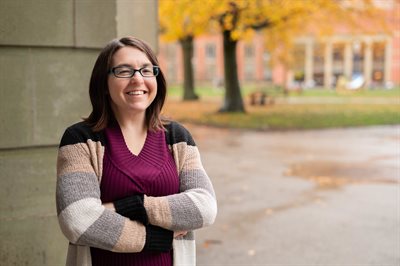PhD Theology and Religion student Faith Van Horne says she chose the University of Birmingham for its world-class, diverse, internationally ranked programme in Theology and Religion. We found out more about her experience as a postgraduate researcher within the Department of Theology and Religion.
Why did you choose to study for a PhD in Theology and Religion?
I had received a Master’s degree in Divinity with the expectation of becoming ordained for ministry. However, in the course of my study I realized that I had questions about doctrine and practice, and my skills and talents did not lie in leading a congregation. Instead, I decided I wanted to research and teach theology. That led to beginning the journey toward applying for a PhD.
Why did you choose to undertake research at the University of Birmingham?

The University of Birmingham has a world-class, diverse, internationally ranked program in Theology and Religion. The department also houses the Centre for Pentecostal and Charismatic Studies. As my research is in this area, University of Birmingham is one of the best places in world to study. The faculty also consists of leading scholars in my field, including my supervisor.
What are the best things about your course?
My supervisor, Wolfgang Vondey, has been instrumental in guiding me in navigating the PhD journey. I have also received valuable peer contacts through the Theology and Religion Forum, a Zoom seminar space that allows PGRs as well as other scholars to share work in their research areas and receive feedback. The library is an excellent study space; I especially appreciate the quiet and well-furnished PGR study space. Library services are also excellent. If a resource has not been available, I have been able to request it via MoreBooks or ILL. I also appreciate SCONUL access, which allows me to visit and borrow from other university libraries.
What is life like as a researcher at the University of Birmingham?
I began my program in Autumn of 2020, when Covid restrictions limited my movement and in-person interactions. The past two years have become much more open! I have, for the most part, been able to keep to a roughly 9-5 weekday workday schedule, occasionally going over to prepare for conferences or PGTA responsibilities. (I recognize that my schedule may look different from those who have parenting or caring responsibilities, however.) I tend to work on campus in the mornings, and often can pop home for lunch, which is an easy walk. I have been enjoying exploring the City Centre, as well as Stratford-Upon-Avon, London, and Scotland.
What support have you received outside of your PhD?
Both academic and pastoral support have been readily available. My supervisor has pointed me to conferences and helpful sources, and the departmental and school seminars have provided opportunities to connect with colleagues. Pastoral support through the chaplaincy and counselling services has been invaluable with helping to adjust to the challenges of moving to a new continent and beginning a PhD, particularly during the pandemic.
What is your research about and what do you find most interesting about it?
I am researching Christian teaching on atonement, which is the theological understanding of why and how Jesus is central to humans’ reconciliation with God and others, from the perspective of survivors of sexual abuse. Using an interdisciplinary approach that brings systematic theology into conversation with trauma theory and philosophy is exciting. I appreciate pushing past the “siloing” of academic disciplines that can often prevent productive conversations, and helping academic theology become more relevant and accessible beyond the academy.
Outside of your research, what experience have you gained and how will it help you in the future?
I have gotten to lead seminars as a postgraduate teaching assistant. Since I hope to teach in academia following the completion of my program, the experience has been invaluable, and has confirmed my interest in and commitment to teaching. I have also gotten to present my research at seminars and conferences, making important connections in my discipline. Developing collegial relationships has helped me challenge assumptions in my own research and contribute to larger academic conversations in my field. I also help lead a Christian social justice organization; my experience in leadership there has helped broaden my skillset and prepared me for potential work beyond academia.
Find out more about our PhD Theology and Religion programme over on our course pages.